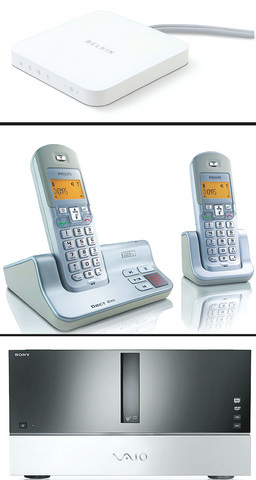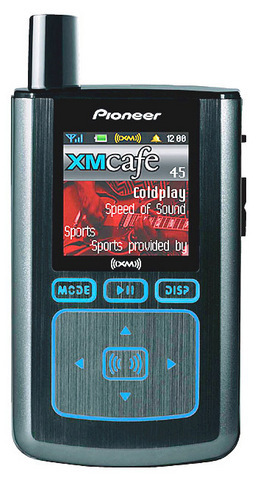Adding a bit of flash to iPods
At night, an iPod makes good company. With the Blinkit from Intuitive Devices, it becomes a low-wattage guardian angel, too.
The Blinkit, which plugs into any iPod with a dock connector, can be used as a flashlight to throw light on the trail ahead or as a safety flasher with beams that can be split and directed forward and back, or left and right.

PHOTOS: NY TIMES
Pressing its power button cycles it through five different programmed flash patterns, as well as a mode that makes it flash to the beat of the music being played. A set of transparent caps for changing the beam color is included in the US$30 price. Blinkit is available from Apple stores or at www.blinkitnow.com.
Using a pair of light-emitting diodes as its light source, the Blinkit draws only 100 milliwatts of power in flashlight mode and about 12 milliwatts while flashing. (It wouldn't be a guardian angel if it drained your batteries.)
a way to keep things tidy

For heavy users of DVDs and CDs -- or those looking for a way to clear the clutter -- Sony offers the Vaio VGP-XL1B2 changer/recorder, which allows users to store, organize and manage up to 200 CDs and DVDs.
The US$799 unit works with PCs using the Windows XP Media Center Edition 2005 operating system, which is designed to manage all-in-one PC-powered home entertainment systems.
The device features the ability to burn DVDs with recorded movies and television programs and it allows users to copy CDs to a hard drive.

Another feature automatically retrieves related information online, including jewel-case cover art, song lists, CD credits, movie credits and plot synopses.
Controllable through the computer's FireWire port, the device can be "daisy-chained" with up to four more units for a maximum capacity of 1,000 discs -- if you're willing to invest nearly US$4,000 in such a setup.
A battery-powered book

In a world filled with complicated MP3 players and online audio stores, it's a wonder that anyone gets any listening done at all. Playaway hopes to change all that by making an audio book purchase as easy as plopping down a credit card at the airport gift shop.
Playaway's MP3 players, about the size of a pack of cigarettes, each contain one unabridged audio book. Titles include The Da Vinci Code and Anansi Boys, with more on the way. The devices come with headphones and a triple-A battery. When you're ready to listen, simply pull a protective tab to get the battery going.
The Playaway cannot be loaded with a different book, but you can add it your library and listen to it again and again.
A small screen shows the elapsed time, and the device has buttons for fast-forwarding, rewinding, adding bookmarks and skipping chapters. There's even a Voice Speed button, which compresses the audio slightly, reducing the total playing time without sacrificing audio quality. Owners of iPods may smirk at a one-book-only device, but Playaway may be the simplest and quickest way to get from the store to Chapter One.
No snap or crackle
When it comes to standard telephone service, nothing exceeds the quality of corded handsets. Unlike popular wireless models, corded phones, which cost as
little as US$20, are free of the crackles and whooshes endemic to cordless models as their users move around the house.
But a new cordless tech-nology promises to change all that. Next month, Philips will introduce its first phones in the US, and they will use new standard Digital Enhanced Cordless Telecommunications (DECT), to improve call quality and security.
DECT operates at 1.9 gigahertz, outside the 2.4-gigahertz frequency used for many wireless devices, making it immune to interference from modems and other wireless phones. The new models -- the DECT 221 (US$110) and the DECT 225 (US$130, with a built-in answering system) -- offer double the battery life of standard wireless phones. The DECT 220, an add-on phone that connects wirelessly to the base station, is US$100. DECT technology also lets compatible phones from other manufacturers connect to the main Philips units.
Pioneer's new inno
Pioneer is best known for in-car stereos and speakers, but that doesn't mean it can't step out a bit.
The Pioneer Inno is a portable XM satellite radio and MP3 player that lets you listen to and even record XM content on the go.
The huge antenna can pick all of XM's 170 channels, and the gigabyte of built-in storage space allows you to record up to 50 minutes of programming at any time.
The Inno has a full color 180-by-180-pixel display and weighs about 127g.
The Inno also has an FM transmitter for playback on any radio, including a car stereo. Finally, there are sports and stock tickers for keeping abreast of the latest news while out and about.
Available next month, the US$399 Inno can also act as a stand-alone MP3 or Windows Media file player and is compatible with the Napster music service.
With satellite radio in your pocket, it might be time to turn in the portable FM radio.

May 26 to June 1 When the Qing Dynasty first took control over many parts of Taiwan in 1684, it roughly continued the Kingdom of Tungning’s administrative borders (see below), setting up one prefecture and three counties. The actual area of control covered today’s Chiayi, Tainan and Kaohsiung. The administrative center was in Taiwan Prefecture, in today’s Tainan. But as Han settlement expanded and due to rebellions and other international incidents, the administrative units became more complex. By the time Taiwan became a province of the Qing in 1887, there were three prefectures, eleven counties, three subprefectures and one directly-administered prefecture, with

It’s an enormous dome of colorful glass, something between the Sistine Chapel and a Marc Chagall fresco. And yet, it’s just a subway station. Formosa Boulevard is the heart of Kaohsiung’s mass transit system. In metro terms, it’s modest: the only transfer station in a network with just two lines. But it’s a landmark nonetheless: a civic space that serves as much more than a point of transit. On a hot Sunday, the corridors and vast halls are filled with a market selling everything from second-hand clothes to toys and house decorations. It’s just one of the many events the station hosts,

Among Thailand’s Chinese Nationalist Party (KMT) villages, a certain rivalry exists between Arunothai, the largest of these villages, and Mae Salong, which is currently the most prosperous. Historically, the rivalry stems from a split in KMT military factions in the early 1960s, which divided command and opium territories after Chiang Kai-shek (蔣介石) cut off open support in 1961 due to international pressure (see part two, “The KMT opium lords of the Golden Triangle,” on May 20). But today this rivalry manifests as a different kind of split, with Arunothai leading a pro-China faction and Mae Salong staunchly aligned to Taiwan.

Two moves show Taichung Mayor Lu Shiow-yen (盧秀燕) is gunning for Chinese Nationalist Party (KMT) party chair and the 2028 presidential election. Technically, these are not yet “officially” official, but by the rules of Taiwan politics, she is now on the dance floor. Earlier this month Lu confirmed in an interview in Japan’s Nikkei that she was considering running for KMT chair. This is not new news, but according to reports from her camp she previously was still considering the case for and against running. By choosing a respected, international news outlet, she declared it to the world. While the outside world